人教版英语九年级下册Unit 13 We’re trying to save the earth! 导学案
文档属性
| 名称 | 人教版英语九年级下册Unit 13 We’re trying to save the earth! 导学案 | 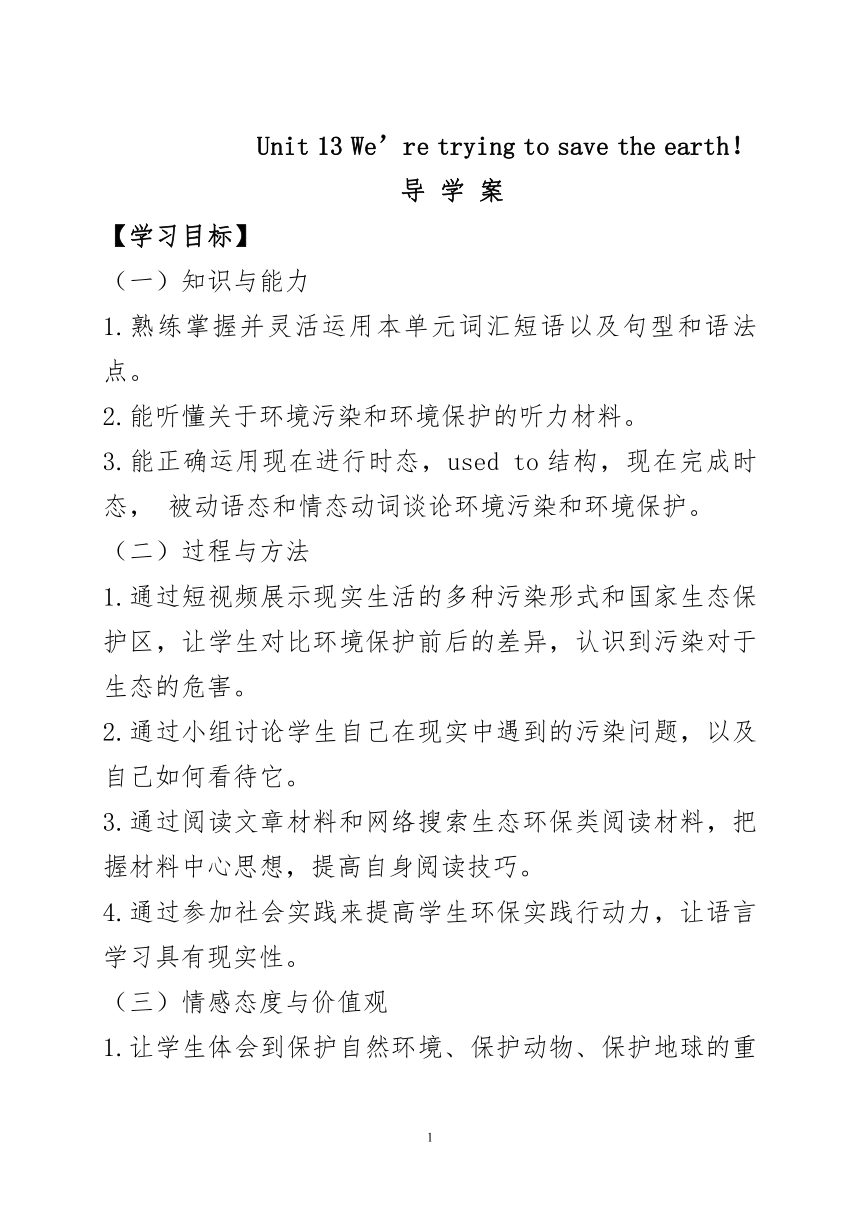 | |
| 格式 | zip | ||
| 文件大小 | 20.8KB | ||
| 资源类型 | 教案 | ||
| 版本资源 | 人教新目标(Go for it)版 | ||
| 科目 | 英语 | ||
| 更新时间 | 2020-01-12 15:43:33 | ||
图片预览

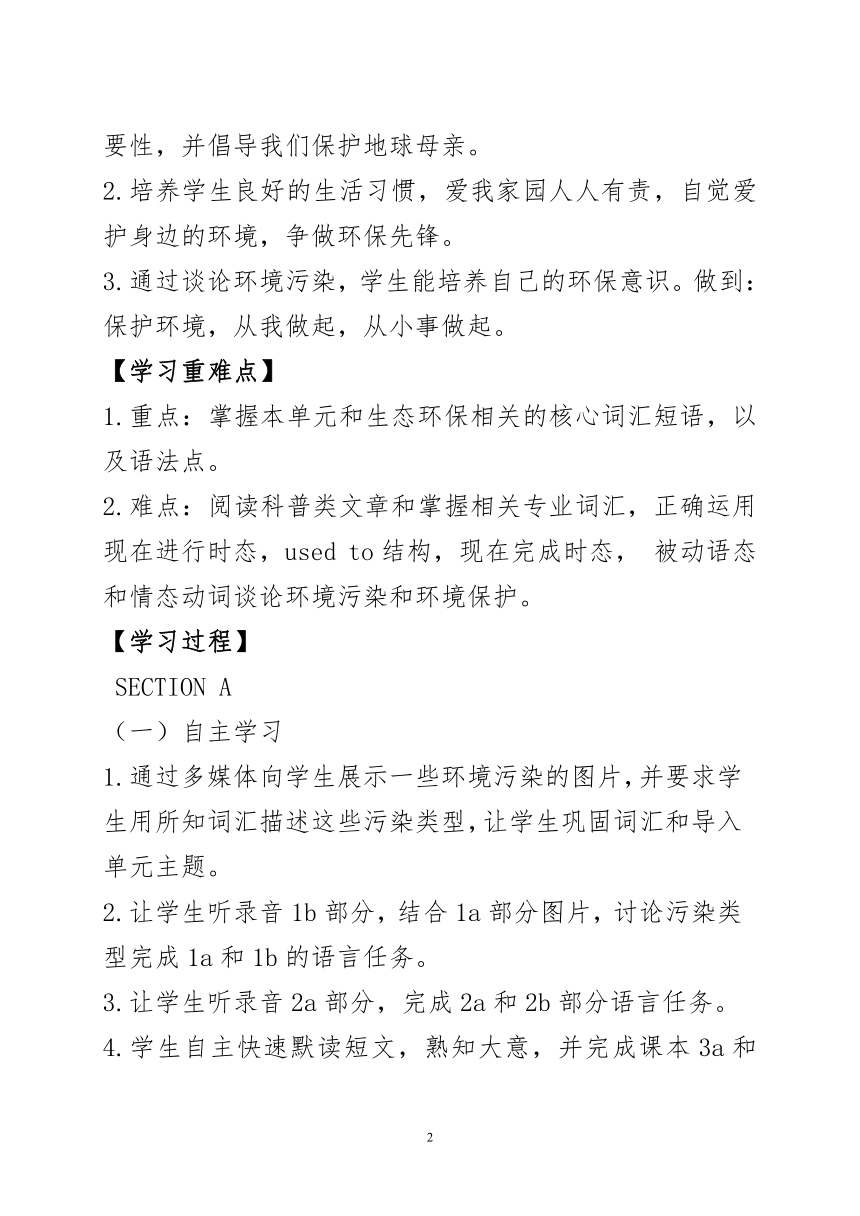
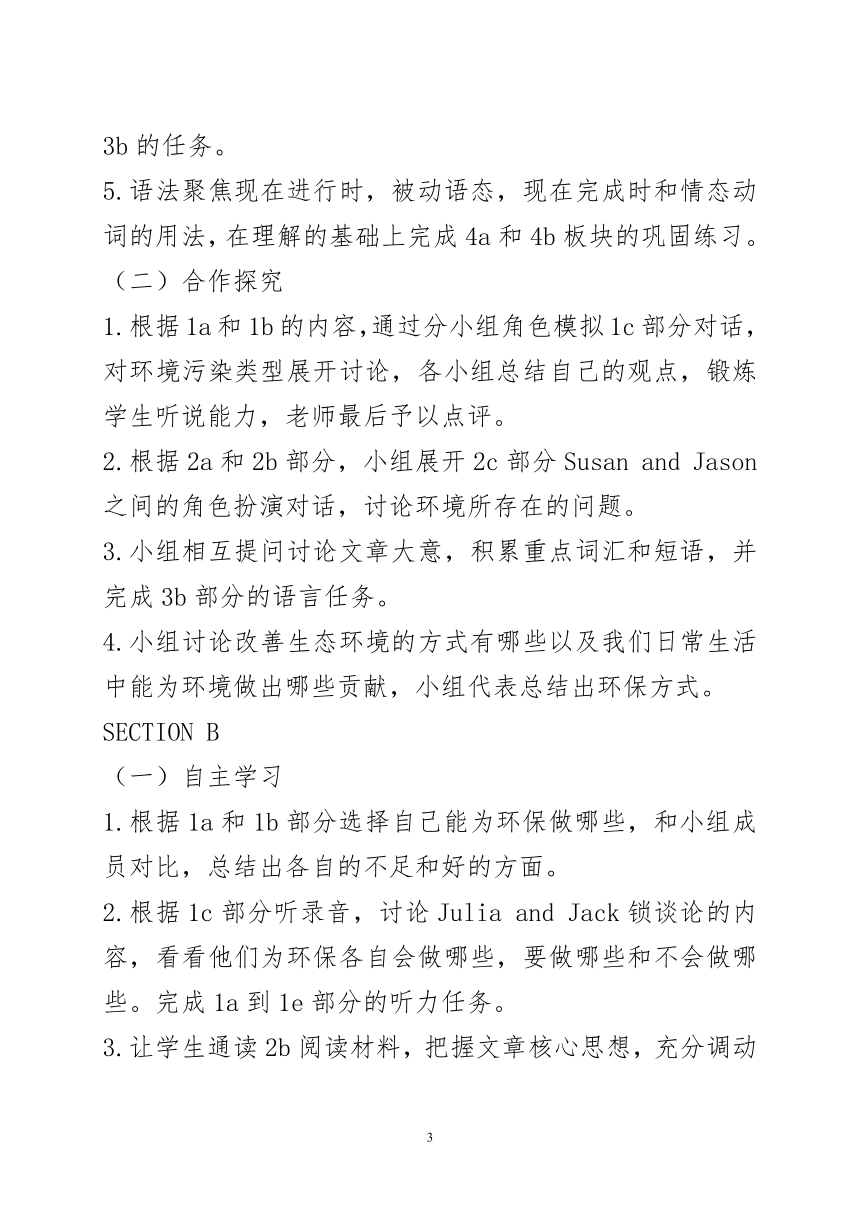
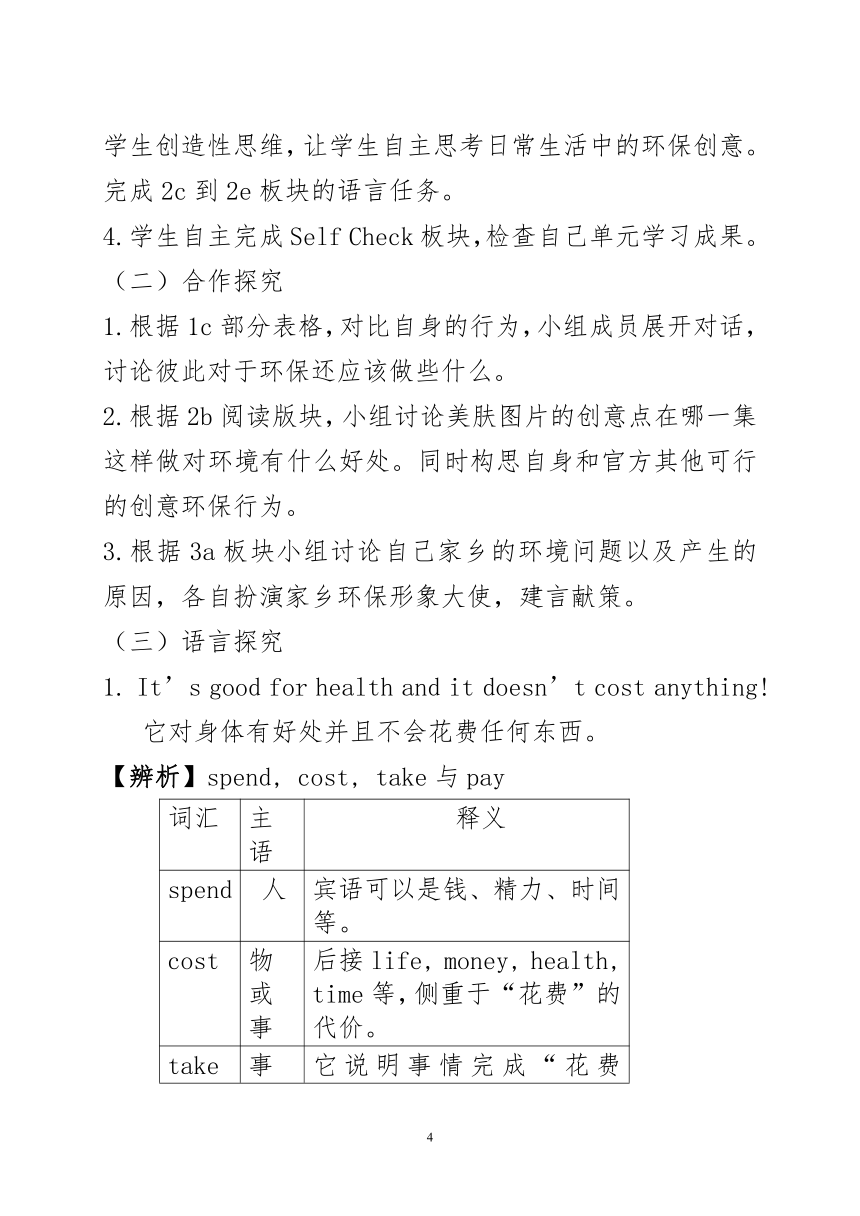
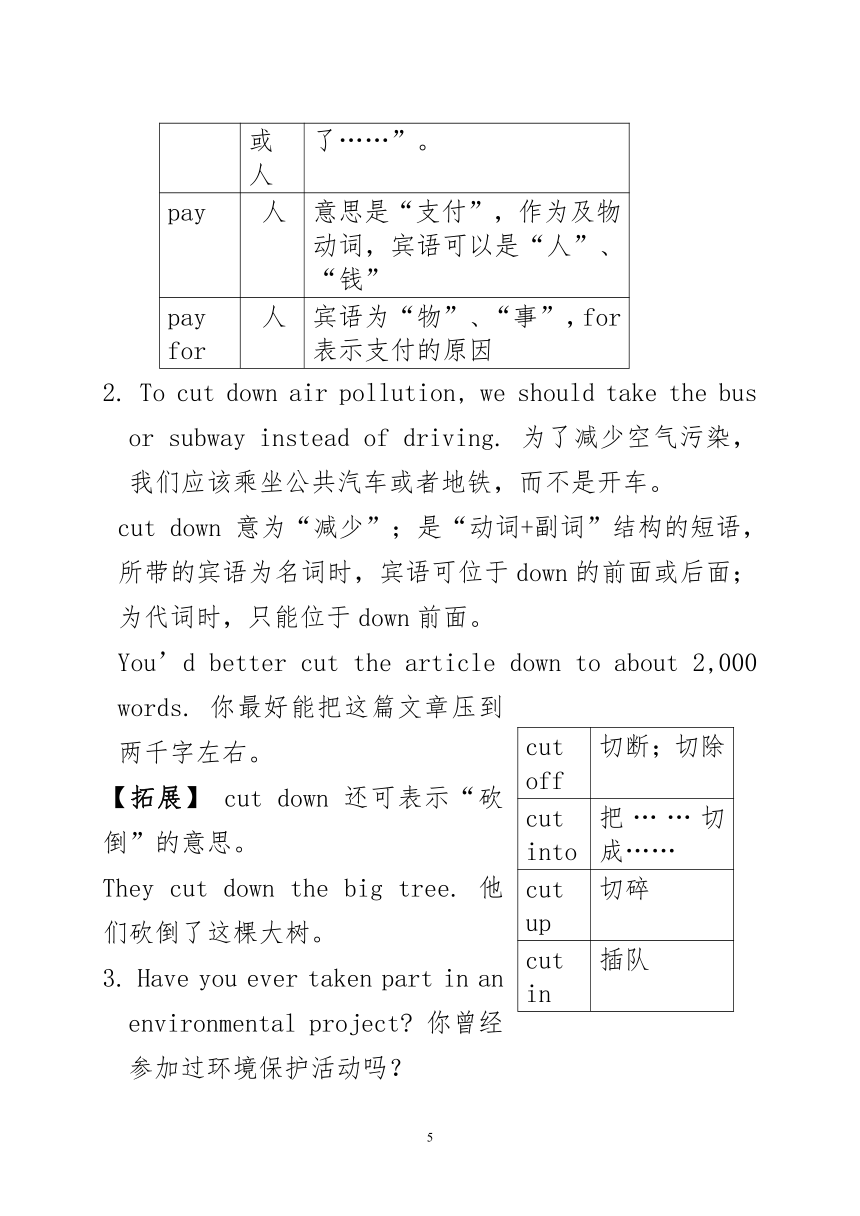
文档简介
Unit 13 We’re trying to save the earth!
导 学 案
【学习目标】
(一)知识与能力
1.熟练掌握并灵活运用本单元词汇短语以及句型和语法点。
2.能听懂关于环境污染和环境保护的听力材料。
3.能正确运用现在进行时态,used to结构,现在完成时态, 被动语态和情态动词谈论环境污染和环境保护。
(二)过程与方法
1.通过短视频展示现实生活的多种污染形式和国家生态保护区,让学生对比环境保护前后的差异,认识到污染对于生态的危害。
2.通过小组讨论学生自己在现实中遇到的污染问题,以及自己如何看待它。
3.通过阅读文章材料和网络搜索生态环保类阅读材料,把握材料中心思想,提高自身阅读技巧。
4.通过参加社会实践来提高学生环保实践行动力,让语言学习具有现实性。
(三)情感态度与价值观
1.让学生体会到保护自然环境、保护动物、保护地球的重要性,并倡导我们保护地球母亲。
2.培养学生良好的生活习惯,爱我家园人人有责,自觉爱护身边的环境,争做环保先锋。
3.通过谈论环境污染,学生能培养自己的环保意识。做到:保护环境,从我做起,从小事做起。
【学习重难点】
1.重点:掌握本单元和生态环保相关的核心词汇短语,以及语法点。
2.难点:阅读科普类文章和掌握相关专业词汇,正确运用现在进行时态,used to结构,现在完成时态, 被动语态和情态动词谈论环境污染和环境保护。
【学习过程】
SECTION A
(一)自主学习
1.通过多媒体向学生展示一些环境污染的图片,并要求学生用所知词汇描述这些污染类型,让学生巩固词汇和导入单元主题。
2.让学生听录音1b部分,结合1a部分图片,讨论污染类型完成1a和1b的语言任务。
3.让学生听录音2a部分,完成2a和2b部分语言任务。
4.学生自主快速默读短文,熟知大意,并完成课本3a和3b的任务。
5.语法聚焦现在进行时,被动语态,现在完成时和情态动词的用法,在理解的基础上完成4a和4b板块的巩固练习。
(二)合作探究
1.根据1a和1b的内容,通过分小组角色模拟1c部分对话,对环境污染类型展开讨论,各小组总结自己的观点,锻炼学生听说能力,老师最后予以点评。
2.根据2a和2b部分,小组展开2c部分Susan and Jason之间的角色扮演对话,讨论环境所存在的问题。
3.小组相互提问讨论文章大意,积累重点词汇和短语,并完成3b部分的语言任务。
4.小组讨论改善生态环境的方式有哪些以及我们日常生活中能为环境做出哪些贡献,小组代表总结出环保方式。
SECTION B
(一)自主学习
1.根据1a和1b部分选择自己能为环保做哪些,和小组成员对比,总结出各自的不足和好的方面。
2.根据1c部分听录音,讨论Julia and Jack锁谈论的内容,看看他们为环保各自会做哪些,要做哪些和不会做哪些。完成1a到1e部分的听力任务。
3.让学生通读2b阅读材料,把握文章核心思想,充分调动学生创造性思维,让学生自主思考日常生活中的环保创意。完成2c到2e板块的语言任务。
4.学生自主完成Self Check板块,检查自己单元学习成果。
(二)合作探究
1.根据1c部分表格,对比自身的行为,小组成员展开对话,讨论彼此对于环保还应该做些什么。
2.根据2b阅读版块,小组讨论美肤图片的创意点在哪一集这样做对环境有什么好处。同时构思自身和官方其他可行的创意环保行为。
3.根据3a板块小组讨论自己家乡的环境问题以及产生的原因,各自扮演家乡环保形象大使,建言献策。
(三)语言探究
1. It’s good for health and it doesn’t cost anything! 它对身体有好处并且不会花费任何东西。
【辨析】spend, cost, take与pay
词汇
主语
释义
spend
人
宾语可以是钱、精力、时间等。
cost
物或事
后接life, money, health, time等,侧重于“花费”的代价。
take
事或人
它说明事情完成“花费了……”。
pay
人
意思是“支付”,作为及物动词,宾语可以是“人”、“钱”
pay for
人
宾语为“物”、“事”,for表示支付的原因
2. To cut down air pollution, we should take the bus or subway instead of driving. 为了减少空气污染,我们应该乘坐公共汽车或者地铁,而不是开车。
cut down 意为“减少”;是“动词+副词”结构的短语,所带的宾语为名词时,宾语可位于down的前面或后面;为代词时,只能位于down前面。
You’d better cut the article down to about 2,000 words. 你最好能把这篇文章压到两千字左右。
cut off
切断;切除
cut into
把……切成……
cut up
切碎
cut in
插队
【拓展】 cut down 还可表示“砍倒”的意思。
They cut down the big tree. 他们砍倒了这棵大树。
3. Have you ever taken part in an environmental project? 你曾经参加过环境保护活动吗?
【辨析】join, join in 与take part in
join
加入组织,团体,党派等,有作为其中的一个成员的含义。
后面也可以加表示人的名词,表示和某人一起参加某活动。
join in
加入一种具体活动。
take part in
指参加会议或群众性活动等,着重说明句子主语参加该项活动并在活动中发挥作用。
Will?you?join?us?in?the?discussion??你参加我们的讨论吗??
She?joined?the?Young?Pioneer. 她加入了少先队。
Why?didn't?you?join?in?the?talk?last?night??昨晚你为什么没参加座谈?
Did you take part in the sports meet? 你参加运动会了吗?
4.We can’t afford to wait any longer to take action! 我们不能再等了,要采取行动了。
① afford是动词,意为“买得起,担负得起”,通常与can,?could,?be?able?to连用,多用于否定句中。
They?couldn’t?afford?$50?for?a?ticket.?他们拿不出50美元买一张票。
② afford后面常跟带to的动词不定式。
We?can’t?afford?to?go?abroad?this?summer. 今年夏天我们没有足够的钱出国。
5.The method is not only cruel, but also harmful to the environment. 这种方法不仅残酷,而且对环境也有害。
harmful 作形容词,意为“有害的”。常构成短语be harmful to “对……有害的”。
Staying up often is harmful to your health. 经常熬夜对你的健康有害。
【拓展】harm 作名词,意为“害处”。常用构成短语do harm to “对……有害”,相当于be harmful to。
Too much smoking does harm to his health. = Too much smoking is harmful to his health. 吸烟过多对他的健康有害。
6. And the gate in front of her house is made of rocks and old glass bottles. 她房子的前门是由岩石和旧玻璃瓶子制成的。
【辨析】be made +介词
be made of
“某物由……制造而成”(从制成品中可以看出原材料)。
be?made?from
“某物由……制造而成”(从制成品中一般看不出或难以分辨出原材料)。
be?made?in
“某物由某地制造”
be?made?by
“某物由某个人或集体制造而成”,其中介词by用来强调动作的执行者。
?be?made?into
某种原料制成某物。
be?made?up?of
某物由……组成或构成。
7. Not only can the art bring happiness to others, but it also shows that even cold, hard iron can be brought back to life with a little creativity. 不仅艺术品能给人们带来快乐,而且冰冷坚硬的钢铁在艺术创作下也恢复了生命。
“not only … but also …”是一个并列连词词组,其意思基本等于“both … and …”。
使用not only … but also … 时须注意的几点:
⑴ not only与but also后面所连接的词的词性必须对等。
They completed the project not only punctually but also perfectly. 他们不仅准时完成工程,而且完成得很出色。
⑵ not only只能连用,而but also既可连用,也可分开用。
Television is not only boring, but it also wastes a lot of time. 电视不仅乏味,而且还浪费许多时间。
⑶ 谓语动词的数应与but also后主语的数保持一致。
Not only you but also Mr Zhang teaches in this?college. 不仅你,张老师也在此学院教书。
⑷ not only放在句首,后接句子时要用倒装结构。
Not only had the poor man been fined, but also he had been sent to prison. 这个可怜的人不仅被罚款,而且还被送进了监狱。
8. Which parts need to be improved? 哪些部分需要被改善?
【辨析】need to be done; need doing与need to do
⑴ need doing=need to be done 需要被……现在分词doing表被动“需要被做”,相当于need to be done。
My watch needs repairing. =My watch needs to be repaired.我的表需要修了。
⑵ need后加不定式,证明need为实义动词,而非情态动词,这时need有人称和数的变化。
He needs to get up early. 他需要早起。
9. What or who is causing these problems? 什么或谁将会导致这些问题?
cause用作动词,当“引起;造成;使得”讲。一般指引起或造成不好的结果。
cause sb. sth.= cause sth. to sb.(后接间接宾语+直接宾语)为固定用法。
He caused his parents much trouble.= He caused much trouble to his parents. 他给父母带来很多烦恼。
【达标训练】
一、用方框中所给词的适当形式填空
cost, wood, law, bottom, recycle
1.We should _____ garbage, not burn it.
2. I think the government must develop _____ to protect environment.
3. The police found a body at the ____ of the lake.
4. The _____ of living in big cities is very high.
5. He keeps a rabbit in a big ____ box.
二、根据汉语意思完成句子
1.杭州以龙井茶而闻名。
Hangzhou is well ________ _________ its Long Jing Tea.
2.这个木箱时装满了书。
The _______ box _______ ________ ________ books.
3.学生们应该好好利用上课时间。
The children should ______ ______ ______ ______ ______ _______ in class.
4.你给他们的钱将会被好好利用。
The money you gave them will _______ ________ ________ ______ _______.
5.为减少空气污染,我们应该乘公共汽车或地铁,而不是开车。
________ ________ ________ air pollution, we should take the bus or subway ________ ________ ________.
三、单项填空
1. He ____ go out with his parents, but now he ____ staying at home alone.
A. used to; is used to B. is used to; used to
C. use to; is used to D. is used to; is used to
2. The old city walls are dangerous. So they will be _____ soon.
A. pulled down B. pulled out C. pulled over D. pulled off
3.—What are the _____ of bike riding?
—It can help cut down air pollution.
A. advantages B. reasons C. results D. ideas
4. —Remember to ____ the lights when you leave the room.
—OK. I will.
A. turn on B. turn down C. turn up D. turn off
5. —Look! _____ boys are playing on the playground.
—Yes. _____ them is about 200.
A. The number of; A number of B. The number of; The number of
C. A number of; the number of D. A number of; A number of
6. —May I go out now, Dad?
—No. You _____ let your mother know first.
A. can B. may C. need D. must
7. Her son _______ Coke, but now he ________ milk.
A. used to drink ; is used to drinking B. used to drinking ; drinks
C. is used to drinking ; used to drink D. is used to drink ; is drinking
8. —_____ you come with me to Lang Lang’s piano concert this evening?
—I’d love to, but I have to study for my math test.
A. Should B. May C. Must D. Can
9. —Tell me one thing you’re proud of in your junior high school, Tony.
—I ___ as captain of the school football team.
A. choose B. chose C. am chosen D. was chosen
10. A true friend can see the pain in your eyes ____ everyone else believes the smile on your face.
A. while B. because C. before D. until
导 学 案
【学习目标】
(一)知识与能力
1.熟练掌握并灵活运用本单元词汇短语以及句型和语法点。
2.能听懂关于环境污染和环境保护的听力材料。
3.能正确运用现在进行时态,used to结构,现在完成时态, 被动语态和情态动词谈论环境污染和环境保护。
(二)过程与方法
1.通过短视频展示现实生活的多种污染形式和国家生态保护区,让学生对比环境保护前后的差异,认识到污染对于生态的危害。
2.通过小组讨论学生自己在现实中遇到的污染问题,以及自己如何看待它。
3.通过阅读文章材料和网络搜索生态环保类阅读材料,把握材料中心思想,提高自身阅读技巧。
4.通过参加社会实践来提高学生环保实践行动力,让语言学习具有现实性。
(三)情感态度与价值观
1.让学生体会到保护自然环境、保护动物、保护地球的重要性,并倡导我们保护地球母亲。
2.培养学生良好的生活习惯,爱我家园人人有责,自觉爱护身边的环境,争做环保先锋。
3.通过谈论环境污染,学生能培养自己的环保意识。做到:保护环境,从我做起,从小事做起。
【学习重难点】
1.重点:掌握本单元和生态环保相关的核心词汇短语,以及语法点。
2.难点:阅读科普类文章和掌握相关专业词汇,正确运用现在进行时态,used to结构,现在完成时态, 被动语态和情态动词谈论环境污染和环境保护。
【学习过程】
SECTION A
(一)自主学习
1.通过多媒体向学生展示一些环境污染的图片,并要求学生用所知词汇描述这些污染类型,让学生巩固词汇和导入单元主题。
2.让学生听录音1b部分,结合1a部分图片,讨论污染类型完成1a和1b的语言任务。
3.让学生听录音2a部分,完成2a和2b部分语言任务。
4.学生自主快速默读短文,熟知大意,并完成课本3a和3b的任务。
5.语法聚焦现在进行时,被动语态,现在完成时和情态动词的用法,在理解的基础上完成4a和4b板块的巩固练习。
(二)合作探究
1.根据1a和1b的内容,通过分小组角色模拟1c部分对话,对环境污染类型展开讨论,各小组总结自己的观点,锻炼学生听说能力,老师最后予以点评。
2.根据2a和2b部分,小组展开2c部分Susan and Jason之间的角色扮演对话,讨论环境所存在的问题。
3.小组相互提问讨论文章大意,积累重点词汇和短语,并完成3b部分的语言任务。
4.小组讨论改善生态环境的方式有哪些以及我们日常生活中能为环境做出哪些贡献,小组代表总结出环保方式。
SECTION B
(一)自主学习
1.根据1a和1b部分选择自己能为环保做哪些,和小组成员对比,总结出各自的不足和好的方面。
2.根据1c部分听录音,讨论Julia and Jack锁谈论的内容,看看他们为环保各自会做哪些,要做哪些和不会做哪些。完成1a到1e部分的听力任务。
3.让学生通读2b阅读材料,把握文章核心思想,充分调动学生创造性思维,让学生自主思考日常生活中的环保创意。完成2c到2e板块的语言任务。
4.学生自主完成Self Check板块,检查自己单元学习成果。
(二)合作探究
1.根据1c部分表格,对比自身的行为,小组成员展开对话,讨论彼此对于环保还应该做些什么。
2.根据2b阅读版块,小组讨论美肤图片的创意点在哪一集这样做对环境有什么好处。同时构思自身和官方其他可行的创意环保行为。
3.根据3a板块小组讨论自己家乡的环境问题以及产生的原因,各自扮演家乡环保形象大使,建言献策。
(三)语言探究
1. It’s good for health and it doesn’t cost anything! 它对身体有好处并且不会花费任何东西。
【辨析】spend, cost, take与pay
词汇
主语
释义
spend
人
宾语可以是钱、精力、时间等。
cost
物或事
后接life, money, health, time等,侧重于“花费”的代价。
take
事或人
它说明事情完成“花费了……”。
pay
人
意思是“支付”,作为及物动词,宾语可以是“人”、“钱”
pay for
人
宾语为“物”、“事”,for表示支付的原因
2. To cut down air pollution, we should take the bus or subway instead of driving. 为了减少空气污染,我们应该乘坐公共汽车或者地铁,而不是开车。
cut down 意为“减少”;是“动词+副词”结构的短语,所带的宾语为名词时,宾语可位于down的前面或后面;为代词时,只能位于down前面。
You’d better cut the article down to about 2,000 words. 你最好能把这篇文章压到两千字左右。
cut off
切断;切除
cut into
把……切成……
cut up
切碎
cut in
插队
【拓展】 cut down 还可表示“砍倒”的意思。
They cut down the big tree. 他们砍倒了这棵大树。
3. Have you ever taken part in an environmental project? 你曾经参加过环境保护活动吗?
【辨析】join, join in 与take part in
join
加入组织,团体,党派等,有作为其中的一个成员的含义。
后面也可以加表示人的名词,表示和某人一起参加某活动。
join in
加入一种具体活动。
take part in
指参加会议或群众性活动等,着重说明句子主语参加该项活动并在活动中发挥作用。
Will?you?join?us?in?the?discussion??你参加我们的讨论吗??
She?joined?the?Young?Pioneer. 她加入了少先队。
Why?didn't?you?join?in?the?talk?last?night??昨晚你为什么没参加座谈?
Did you take part in the sports meet? 你参加运动会了吗?
4.We can’t afford to wait any longer to take action! 我们不能再等了,要采取行动了。
① afford是动词,意为“买得起,担负得起”,通常与can,?could,?be?able?to连用,多用于否定句中。
They?couldn’t?afford?$50?for?a?ticket.?他们拿不出50美元买一张票。
② afford后面常跟带to的动词不定式。
We?can’t?afford?to?go?abroad?this?summer. 今年夏天我们没有足够的钱出国。
5.The method is not only cruel, but also harmful to the environment. 这种方法不仅残酷,而且对环境也有害。
harmful 作形容词,意为“有害的”。常构成短语be harmful to “对……有害的”。
Staying up often is harmful to your health. 经常熬夜对你的健康有害。
【拓展】harm 作名词,意为“害处”。常用构成短语do harm to “对……有害”,相当于be harmful to。
Too much smoking does harm to his health. = Too much smoking is harmful to his health. 吸烟过多对他的健康有害。
6. And the gate in front of her house is made of rocks and old glass bottles. 她房子的前门是由岩石和旧玻璃瓶子制成的。
【辨析】be made +介词
be made of
“某物由……制造而成”(从制成品中可以看出原材料)。
be?made?from
“某物由……制造而成”(从制成品中一般看不出或难以分辨出原材料)。
be?made?in
“某物由某地制造”
be?made?by
“某物由某个人或集体制造而成”,其中介词by用来强调动作的执行者。
?be?made?into
某种原料制成某物。
be?made?up?of
某物由……组成或构成。
7. Not only can the art bring happiness to others, but it also shows that even cold, hard iron can be brought back to life with a little creativity. 不仅艺术品能给人们带来快乐,而且冰冷坚硬的钢铁在艺术创作下也恢复了生命。
“not only … but also …”是一个并列连词词组,其意思基本等于“both … and …”。
使用not only … but also … 时须注意的几点:
⑴ not only与but also后面所连接的词的词性必须对等。
They completed the project not only punctually but also perfectly. 他们不仅准时完成工程,而且完成得很出色。
⑵ not only只能连用,而but also既可连用,也可分开用。
Television is not only boring, but it also wastes a lot of time. 电视不仅乏味,而且还浪费许多时间。
⑶ 谓语动词的数应与but also后主语的数保持一致。
Not only you but also Mr Zhang teaches in this?college. 不仅你,张老师也在此学院教书。
⑷ not only放在句首,后接句子时要用倒装结构。
Not only had the poor man been fined, but also he had been sent to prison. 这个可怜的人不仅被罚款,而且还被送进了监狱。
8. Which parts need to be improved? 哪些部分需要被改善?
【辨析】need to be done; need doing与need to do
⑴ need doing=need to be done 需要被……现在分词doing表被动“需要被做”,相当于need to be done。
My watch needs repairing. =My watch needs to be repaired.我的表需要修了。
⑵ need后加不定式,证明need为实义动词,而非情态动词,这时need有人称和数的变化。
He needs to get up early. 他需要早起。
9. What or who is causing these problems? 什么或谁将会导致这些问题?
cause用作动词,当“引起;造成;使得”讲。一般指引起或造成不好的结果。
cause sb. sth.= cause sth. to sb.(后接间接宾语+直接宾语)为固定用法。
He caused his parents much trouble.= He caused much trouble to his parents. 他给父母带来很多烦恼。
【达标训练】
一、用方框中所给词的适当形式填空
cost, wood, law, bottom, recycle
1.We should _____ garbage, not burn it.
2. I think the government must develop _____ to protect environment.
3. The police found a body at the ____ of the lake.
4. The _____ of living in big cities is very high.
5. He keeps a rabbit in a big ____ box.
二、根据汉语意思完成句子
1.杭州以龙井茶而闻名。
Hangzhou is well ________ _________ its Long Jing Tea.
2.这个木箱时装满了书。
The _______ box _______ ________ ________ books.
3.学生们应该好好利用上课时间。
The children should ______ ______ ______ ______ ______ _______ in class.
4.你给他们的钱将会被好好利用。
The money you gave them will _______ ________ ________ ______ _______.
5.为减少空气污染,我们应该乘公共汽车或地铁,而不是开车。
________ ________ ________ air pollution, we should take the bus or subway ________ ________ ________.
三、单项填空
1. He ____ go out with his parents, but now he ____ staying at home alone.
A. used to; is used to B. is used to; used to
C. use to; is used to D. is used to; is used to
2. The old city walls are dangerous. So they will be _____ soon.
A. pulled down B. pulled out C. pulled over D. pulled off
3.—What are the _____ of bike riding?
—It can help cut down air pollution.
A. advantages B. reasons C. results D. ideas
4. —Remember to ____ the lights when you leave the room.
—OK. I will.
A. turn on B. turn down C. turn up D. turn off
5. —Look! _____ boys are playing on the playground.
—Yes. _____ them is about 200.
A. The number of; A number of B. The number of; The number of
C. A number of; the number of D. A number of; A number of
6. —May I go out now, Dad?
—No. You _____ let your mother know first.
A. can B. may C. need D. must
7. Her son _______ Coke, but now he ________ milk.
A. used to drink ; is used to drinking B. used to drinking ; drinks
C. is used to drinking ; used to drink D. is used to drink ; is drinking
8. —_____ you come with me to Lang Lang’s piano concert this evening?
—I’d love to, but I have to study for my math test.
A. Should B. May C. Must D. Can
9. —Tell me one thing you’re proud of in your junior high school, Tony.
—I ___ as captain of the school football team.
A. choose B. chose C. am chosen D. was chosen
10. A true friend can see the pain in your eyes ____ everyone else believes the smile on your face.
A. while B. because C. before D. until
同课章节目录
- Unit 1 How can we become good learners.
- Section A
- Section B
- Unit 2 I think that mooncakes are delicious!
- Section A
- Section B
- Unit 3 Could you please tell me where the restroom
- Section A
- Section B
- Unit 4 I used to be afraid of the dark.
- Section A
- Section B
- Unit 5 What are the shirts made of?
- Section A
- Section B
- Review of Units 1-5
- Unit 6 When was it invented?
- Section A
- Section B
- Unit 7 Teenagers should be allowed to choose their
- Section A
- Section B
- Unit 8 It must belong to Carla.
- Section A
- Section B
- Unit 9 I like music that I can dance to.
- Section A
- Section B
- Unit 10 You're supposed to shake hands.
- Section A
- Section B
- Review of Units 6-10
- Unit 11 Sad movies make me cry.
- Section A
- Section B
- Unit 12 Life is full of the unexpected
- Section A
- Section B
- Unit 13 We're trying to save the earth!
- Section A
- Section B
- Unit 14 I remember meeting all of you in Grade 7.
- Section A
- Section B
- Review of Units 11-14
